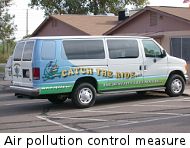Arizona: Federal Judge Overrules Legislature on Transit Subsidies
Arizona must subsidize those who ride on buses, vans and light rail, regardless of the desire of state lawmakers or voters to do otherwise. US District Court Judge David G. Campbell on Friday overturned a state law enacted in March last year to curtail excessive spending by slashing such subsidies. The legislature canceled the Local Transportation Assistance Fund, which had doled out $127 million in taxpayer cash since 1998 to various mass transit programs using funds from the Powerball lottery.
For example, Arizona funnels public money into privately run van service companies, counties, municipalities and Indian tribes under the federally authorized Section 5310 mass transit program. The grants provide capital funds for the purchase of vehicles that are used mostly to provide subsidized transport for people over the age of sixty. The University of Arizona received one of these grants through Pima County to buy three golf carts in 2008. Bullhead City offers complimentary paratransit service with 15 percent of its senior citizen passengers boarding at the Laughlin Casino Resort.
“Defendants assert that this lawsuit has no significance to air quality or transit services in the Phoenix area,” Judge Campbell wrote. “But the advisability of requiring lottery funding for transit, or other policy considerations that went into the SIP, are not for this court to decide.”
Campbell’s order effectively nullified House Bill 2012, which had repealed the Local Transportation Assistance Fund. He also ordered the state to provide up to $18 million in funding each year to such programs.
“This circuit has made clear that provisions of an EPA-approved SIP are federally enforceable in district court through the CAA’s citizen suit provision,” Campbell ruled. “Absent prior approval from the EPA, the Arizona legislature lacked authority to repeal the portions of A.R.S. Section 5-522(A) that are included in the SIP, and that the legislature’s attempt to do so therefore is null and void and the lottery funding requirement included in the SIP remains in full force and effect.”
A copy of the ruling is available in a 90k PDF file at the source link below. Pictured: a van purchased by the Apache Junction Parks and Recreation department using LTAF funding.
Source:
Paisley v. Darwin (US District Court, Arizona, 9/2/2011)
[Courtesy: Thenewspaper.com]
More by The Newspaper
Latest Car Reviews
Read moreLatest Product Reviews
Read moreRecent Comments
- 3-On-The-Tree Besides for the sake of emissions I don’t understand why the OEM’s went with small displacement twin turbo engines in heavy trucks. Like you guys stated above there really isn’t a MPG advantage. Plus that engine is under stress pulling that truck around then you hit it with turbos, more rpm’s , air, fuel, heat. My F-150 Ecoboost 3.5 went through one turbo replacement and the other was leaking. l’ll stick with my 2021 V8 Tundra.
- Syke What I'll never understand about economics reporting: $1.1 billion net income is a mark of failure? Anyone with half a brain recognizes that Tesla is slowly settling in to becoming just another EV manufacturer, now that the legacy manufacturers have gained a sense of reality and quit tripping over their own feet in converting their product lines. Who is stupid enough to believe that Tesla is going to remain 90% of the EV market for the next ten years?Or is it just cheap headlines to highlight another Tesla "problem"?
- Rna65689660 I had an AMG G-Wagon roar past me at night doing 90 - 100. What a glorious sound. This won’t get the same vibe.
- Marc Muskrat only said what he needed to say to make the stock pop. These aren't the droids you're looking for. Move along.
- SCE to AUX I never believed they cancelled it. That idea was promoted by people who concluded that the stupid robotaxi idea was a replacement for the cheaper car; Tesla never said that.


































Comments
Join the conversation
So much for the USA being a Democracy. It's become a judgocracy.
Oh how I loathe those activist judges that don't do what I want them to do! Actually I am being redundant here because they are not activist judges if they do what I want them to do. The EPA was created by Congress and given, by Congress, a set of rules under which it must operate under. The EPA, like all administrative agencies of the United States, has the full authority of Congress under those rules because Congress delegated its authority to the administrative agency. This is a well-established part of the United States government, has been upheld on many occasions by various Supreme Courts that have leaned both left and right, and it has been this way for more than 100 years. If you don't like the rules, you get Congress to change them. You don't create a new law at the state level like Arizona did, because the courts will throw it away. The right solution but the wrong approach. Case closed.